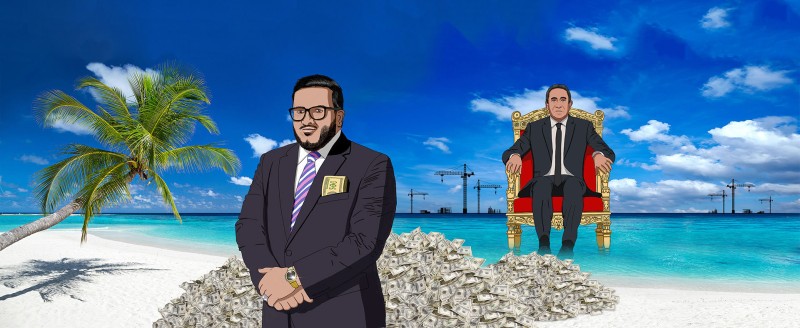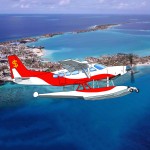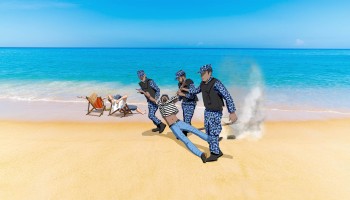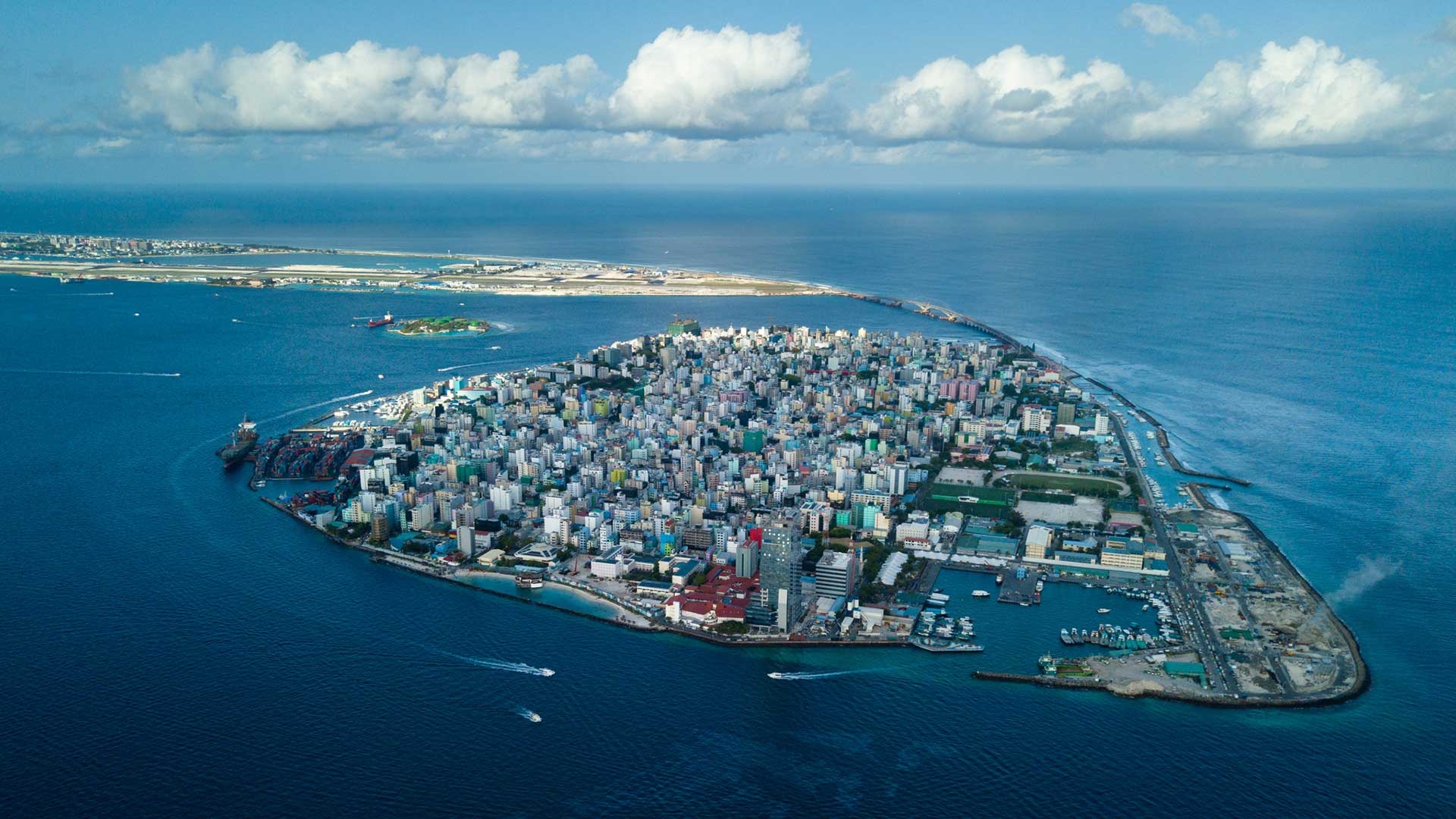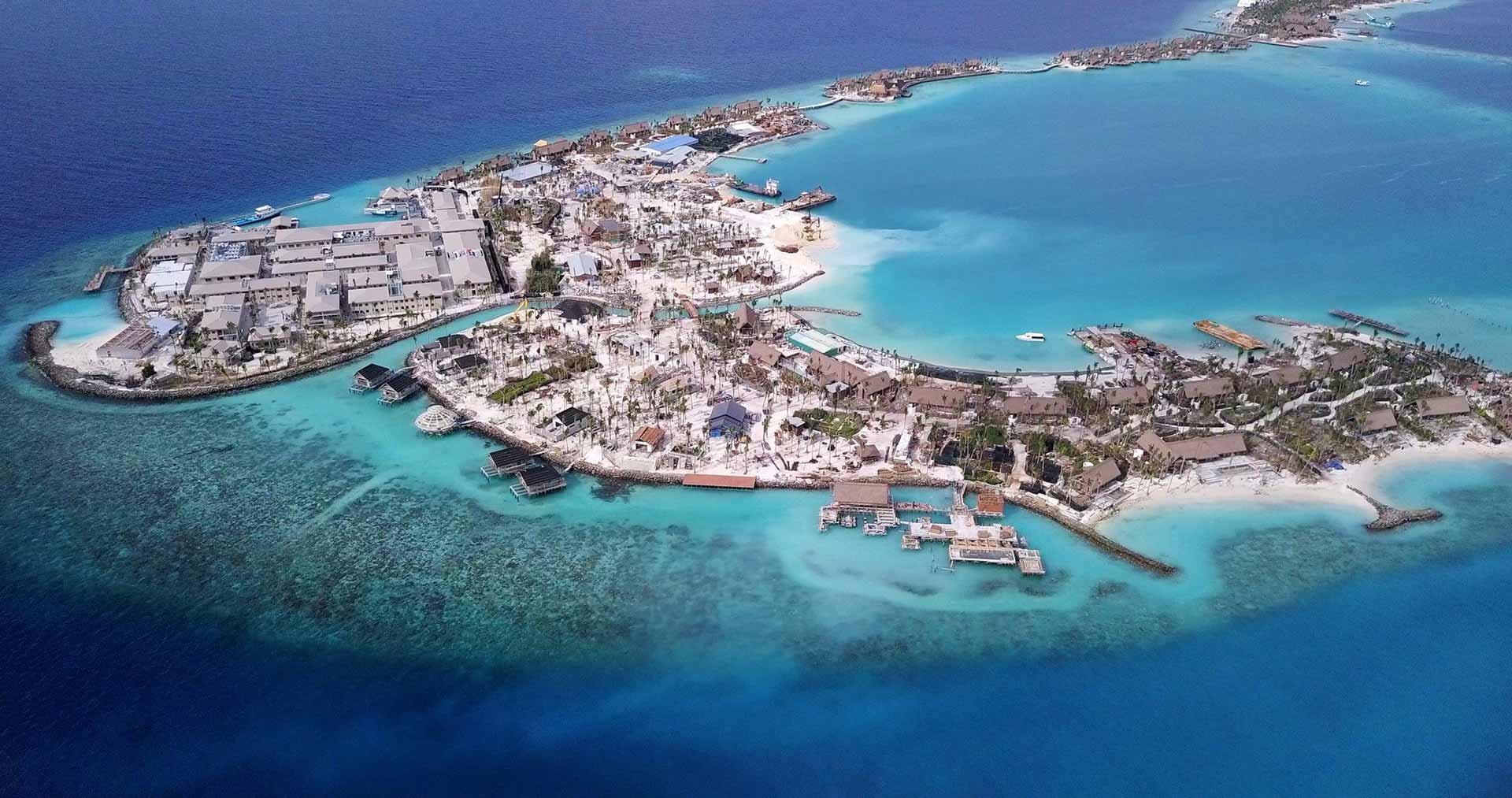They called themselves “the untouchables,” and they committed their crimes in the clearest of tropical daylight, behind the fist of an authoritarian government.
In just 18 months, a coterie of senior officials in the Maldives, with help from President Abdulla Yameen, leased scores of the country’s idyllic islands to tourism developers via corrupt deals, while keeping tens of millions of dollars for themselves. It was an audacious theft, and everyone — from local tycoons to international businesses — got something out of it.
Everyone, that is, except the Maldivian people.
The public face of the scam was Ahmed Adeeb, then a powerful tourism minister who for a time also served concurrently as vice president. In a short career that imploded spectacularly when he was charged with terrorism, corruption, and abuse of power, Adeeb oversaw a system of bribery and influence-peddling, backed by threats of violence, that stripped the country of almost $80 million.
Adeeb is now serving a decades-long prison term. But the true extent of the firesale he arranged has remained largely obscured in a country where the media is frequently harassed and courts have proven pliable to the strongman Yameen. Though Adeeb has already been convicted on some of the charges relating to his dealings, it was left unclear who got the leases to most of the islands and lagoons — and Yameen’s government has said that it does not intend to take them back.
The Organized Crime and Corruption Reporting Project (OCCRP) looked in-depth for the first time at the deals and found new evidence implicating the president, and tracked the names those who benefitted from the leases.
Using a series of leaked files and public documents, reporters gathered details on over 50 islands and submerged coral lagoons that were leased out via the scam, which ran from 2014 and 2015. By comparison, just over 100 resorts had been built in the country over the previous four decades.
The deals were carried out without public tender and were thus — according to the country’s former top auditor — illegal. The prices set for the leases ranged from mere hundreds of thousands to several million dollars apiece.
The files obtained by reporters implicate scores of companies and individuals. These include a who’s who of Maldivian tourism tycoons and a global cohort of businessmen and major corporations. Resorts planned or already built on the islands include internationally recognized brands such as the Waldorf Astoria, Westin, and Meliá hotel chains.
Messages leaked from Adeeb’s phones show at least one billionaire who got in on the action. Singaporean hotelier Ong Beng Seng, as well as representatives of his company, Hotel Properties Limited, apparently showered both Adeeb and President Yameen with gifts of luxury hotel accommodation.
Internal tourism ministry files obtained by OCCRP also show that President Yameen’s office was recorded as intervening in at least 24 deals to grant the necessary permissions. According to text messages from Adeeb’s phone, the president was personally involved in discussions related to at least one of the deals.
For Niyaz Ibrahim, a former Maldivian auditor-general who fled the country in 2016, the investigation shows that everyone — from the government to local businessmen and foreign investors — knowingly flouted a longstanding clause of the tourism law that required islands, which are public property, to be leased only after open public bids. That makes the deals illegal, Niyaz said.
“They cannot say they were not aware of the law,” he said.
“They’ve been doing this for ages, and so they know there is no way for the public to hold these criminals accountable,” Niyaz said, referring to the beneficiaries of the latest deals, who he recognized as familiar power players in the country’s tourism industry. “They take Maldives law as a joke.”
President Yameen did not respond to questions sent by reporters. Adeeb also did not respond to questions sent via his lawyers.
Reporters sent detailed questions to Ong via his company, HPL, but received no reply.
The Goldmine Archipelago
The Maldives is a nation of over 1,000 islands spread thinly across 900 kilometers in the Indian Ocean. The country is a patchwork of coral atolls, some of which peek just enough out of the water to provide land for small settlements, beaches, and coconut palm plantations. Nearly 40 percent of the population of roughly 350,000 live in the capital, Male, an island metropolis of towers and tenements that’s shorter than the runway of the city’s airport, which sits on its own artificial island nearby.
Over the last few decades, a tourism boom has radically changed what was once a backwater, its reefs avoided by centuries of sailors. The first tourists arrived in the 1970s to find a country with no hospitality industry at all. By 2016, their number had risen to nearly 1.3 million per year, most staying at the country’s island resorts.
In the waters around Male, rows of ships wait to disgorge the food, fuel, and raw materials needed to maintain this growth. On nearby reefs, sand hauled from the ocean floor is being stacked up to create artificial island megaprojects that will host new hotels, marinas, conference centers, and even entire suburbs.
But the influx of foreign currency is a bounty that hasn’t been shared equally. Both the Maldives’ tourism industry and its politics are dominated by a tight circle of elites, and contests over power can be brutal. Under the 30-year rule of former dictator Maumoon Abdul Gayoom, tourism concessions were largely a reward for those close to power. The typical model, then and since, has been to lease out an entire island or coral lagoon to the operator of a single resort, skewing the industry in favor of large developers over small businesspeople.
Gayoom was voted out of office in 2008 in the country’s first-ever democratic election. But since then, the Maldives’ young democracy has faltered. Gayoom’s half-brother, the current President Yameen, came to power in 2013. Since then, he has cracked down on the political opposition, harassed protesters, and constrained the independent press. Human rights activists fear that the country is descending into one-party rule.
The next elections are slated for September 23. They are expected to be neither free nor fair.
The Bro Economy
Under Yameen’s rule, the 36-year-old Ahmed Adeeb was, for a brief moment, a rising star. Having worked as tourism minister in a previous government, he was re-appointed as a member of Yameen’s first cabinet. In mid-2015, Adeeb was promoted to also serve simultaneously as vice president.
But the two men soon fell out. In September of that year, an explosion on Yameen’s yacht injured his wife. The government blamed Adeeb for the alleged assassination attempt. He was impeached and charged with terrorism. (FBI investigators invited to help examine the case, however, said they found no conclusive evidence of a bomb.)
Adeeb’s downfall led to the revelation of widespread graft that had been underway right up until his spectacular rift with the president. This led to a slew of corruption charges against Adeeb and key allies, and his own conviction in 2016. The court cases and an official audit soon revealed the broad outline of a scam to sell off the country’s islands. A 2016 documentary by Al Jazeera used leaked files from Adeeb’s three gold-colored iPhones to give the scam a name: “the Bro Economy.” The documentary also alleged corruption by the president.
The same material, plus additional leaks, forms the basis of this OCCRP investigation.
What’s in the Files?
This investigation was put together using a series of leaks and other documents.
At the center of it all was the relationship between Adeeb and his friend Abdulla Ziyath, then the managing director of the Maldives Marketing & Public Relations Corporation (MMPRC). Set up in 2009 to promote the country abroad as a tourism destination, the state company soon slipped into a role for which it had never been intended: leasing out islands.
The scam involved both men working in tandem. It was brutally simple.
Under the law then in operation, the country’s islands could only be leased out for tourism development for periods of up to 50 years via an openly announced bidding process. It was a rule that had been in place since the late 1970s, but Adeeb and Ziyath figured out how to bypass it.
The Man Who Tried to Raise the Alarm
Former Maldivian Auditor General Niyaz Ibrahim was one of the first people to notice something was wrong at the Maldives’ tourism authorities.
Starting in May 2014, interested investors simply approached the two officials, or hooked up with their middlemen, to arrange for their own slice of paradise. Then, rather than handing out the leases itself, the tourism ministry did so through the MMPRC. The developers then paid the MMPRC, cutting out the tourism ministry entirely.
Then, rather than putting it into state coffers, Adeeb and his cronies simply deposited the vast majority of the money into private bank accounts, including one belonging to a company named after Scores of Flair, a music group made up of the minister’s friends. Some of the money was then reportedly distributed by bagmen loyal to President Yameen to members of parliament, judges, and street gangsters. The country’s Anti-Corruption Commission reportedly found that $1 million was transferred to a bank account in the president’s name.
The government ended up with almost nothing.
A 2016 audit found that state losses amounted to nearly $80 million. It also found that some lucky investors got islands for millions of dollars less than what they would have paid following a regular process.
“Those who benefitted were the ones who had a direct line to the minister,” a tourism businessman, who was involved in efforts to put together one of the deals, told OCCRP on condition of anonymity, citing fear of reprisals. “It was all done in the open.”
“Some foreigners flew in just to sign the deals,” the businessman said. “They must all have known it was all illegal.”
Leaked text messages from Adeeb’s phones show how the scam got its name. Frequently addressing each other as “bro,” Adeeb, Ziyath and others openly discussed island leases and plotted how to divert the money and apportion what they called “gifts” to deal participants.
During discussions over one deal, Ziyath remarked to the then-tourism minister, in apparent amazement: "Ey Adeeb you're the single most powerful man in the Maldives."
In another discussion, Adeeb confided to Ziyath his plans to sell off whole regions of the country.
“We will make zone deals not only islands hehe," Adeeb wrote.
"The untouchables," Ziyath replied.
“Obviously the President Knew”
Key to the operation of the scam, current and former government officials say, was President Yameen himself.
Even Adeeb, speaking from custody, has claimed that, before his rift with Yameen, he was tasked with running the country while the president “counted the cash.” The president has denied any involvement.
A government official with direct knowledge of the deals who spoke anonymously out of fear of retribution told OCCRP that the president was involved.
Under Maldives law, uninhabited islands are managed by the ministry of fisheries and agriculture. In order to lease them out for development, Adeeb routinely sought — and received — orders from the president to bring the islands under his ministry, the official said.
“Obviously the president knew,” he said.
Leaked tourism ministry files obtained by reporters back this up. They show that the president’s office was logged as issuing letters that reassigned islands to the tourism ministry in at least 24 deals.
Indeed, messages from Adeeb’s phone show that Yameen knew about at least one MMPRC island deal from the earliest moments of the scam. On June 30, 2014, Yameen messaged the tourism minister to ask about Mathiveri Finolhu, an island in the Alif Alif Atoll. Seven minutes later, Adeeb replied: “Today will Hand over sir, sorry for the delay.”
On the following day, July 1, the president’s office instructed the tourism ministry to lease the island via the MMPRC. Internal records show that, three weeks later, the lease was granted for $1.3 million to a Maldivian company called International Travel Consultant Pvt Ltd. The company’s founder, local businessman Abdul Razzag Ali, joined with a Russian partner to develop a resort on the island.
A later report by the Maldives’ Anti-Corruption Commission (ACC) found that Ziyath had embezzled the money paid for the island.
Contacted by reporters, Razzag said: “I never had any direct contact with the president.”
Adeeb’s phone messages also show that Yameen apparently had at least one meeting with Ong Beng Seng, the Singaporean hotelier. Ong’s company received two island leases shortly after.
Yameen did not respond to detailed questions sent by reporters. But in an interview on Maldivian television on Sunday night, the president acknowledged, for the first time, that he had authorized the transfer of islands to Adeeb’s ministry to be leased out. He said that it had been part of a plan to meet budget shortfalls by increasing the number of resorts operating in the country.
“In principle, the issue was not with the lease of islands. The issue is what happened to the proceeds. That was not known to the president. But the president knew when islands under agriculture were transferred to tourism,” Yameen said, referring to himself in the third person.
An Artificial Idyll
The files obtained by reporters show that massive luxury projects are being built on plots often leased for little more than the cost of a house in a major Western city.
Take for example the little bit of uninhabited coral lagoon at 4°0'47.62" N 73°22'57.86"E, just over 20 kilometers southwest of the capital, Male.
Leaked records show the island was leased on May 27, 2015 to a local subsidiary of ASSETS Real Estate Development, a Qatar-based company run by Syria-born brothers Moutaz and Ramez Al-Khayyat. The price tag: $1.5 million.
Now, the site has been transformed. Where once there was only submerged reef and a small sandbank, vessels have dredged up sand to create four artificial islands. Work crews have driven pylons into the sea, shipped in trees, and constructed a winding series of overwater walkways. From east to west, the massive construction site now sprawls for more than 2.5 kilometers.
The development is slated to open as the Waldorf Astoria Maldives Ithaafushi, a five-star resort of 138 private villas, each with its own pool and jacuzzi. The hotel will be managed by the hospitality giant Hilton Worldwide, which owns the Waldorf Astoria brand.
Reporters visiting the site in August saw flotsam from the construction site bobbing in the water, as well as washed up on a sandbank; on one reef near the project, coral was covered in sand and appeared to have undergone bleaching.
Meanwhile, the Maldivian people likely have not even seen the money paid out for the lease. On June 1, just five days after its signing date, records from the Scores of Flair bank account — used by Adeeb and associates to divert the money — show the deposit of a check for $1.5 million, the same amount as the lease price.
Ramez Al-Khayyat, the CEO of ASSETS, did not respond to questions sent by email.
A spokeswoman for Hilton, Meg Ryan, told reporters the company does not have an ownership stake in the resort.
“Hilton has an agreement to provide hotel management services to the owners of Waldorf Astoria Ithaafushi, which was completed following due diligence in accordance with Hilton’s processes,” Ryan said.
Legalize It
While President Yameen has vehemently denied any involvement in the illegal island sales, he has done precious little to correct the massive corruption exposed in Adeeb’s downfall.
Adeeb’s replacement as tourism minister has publicly rejected calls to rescind the island leases, reportedly arguing that existing deals should be honored.
More strikingly, the president’s loyalists in parliament passed an amendment to the tourism law in 2016 that removed the requirement for public tenders entirely. Opposition politicians denounced the move as a measure that effectively “legalizes corruption.”
The legislative change was so controversial that even Yameen’s half-brother, the former dictator Gayoom, came out in public opposition.
He now sits in prison.
Additional Reporting by Aisha Kehoe Down.
